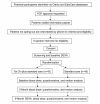Tai Chi for osteopenic women: design and rationale of a pragmatic randomized controlled trial
- PMID: 20193083
- PMCID: PMC2845096
- DOI: 10.1186/1471-2474-11-40
Tai Chi for osteopenic women: design and rationale of a pragmatic randomized controlled trial
Abstract
Background: Post-menopausal osteopenic women are at increased risk for skeletal fractures. Current osteopenia treatment guidelines include exercise, however, optimal exercise regimens for attenuating bone mineral density (BMD) loss, or for addressing other fracture-related risk factors (e.g. poor balance, decreased muscle strength) are not well-defined. Tai Chi is an increasingly popular weight bearing mind-body exercise that has been reported to positively impact BMD dynamics and improve postural control, however, current evidence is inconclusive. This study will determine the effectiveness of Tai Chi in reducing rates of bone turnover in post-menopausal osteopenic women, compared with standard care, and will preliminarily explore biomechanical processes that might inform how Tai Chi impacts BMD and associated fracture risks.
Methods/design: A total of 86 post-menopausal women, aged 45-70y, T-score of the hip and/or spine -1.0 and -2.5, have been recruited from primary care clinics of a large healthcare system based in Boston. They have been randomized to a group-based 9-month Tai Chi program plus standard care or to standard care only. A unique aspect of this trial is its pragmatic design, which allows participants randomized to Tai Chi to choose from a pre-screened list of community-based Tai Chi programs. Interviewers masked to participants' treatment group assess outcomes at baseline and 3 and 9 months after randomization. Primary outcomes are serum markers of bone resorption (C-terminal cross linking telopeptide of type I collagen), bone formation (osteocalcin), and BMD of the lumbar spine and proximal femur (dual-energy X-ray absorptiometry). Secondary outcomes include health-related quality-of-life, exercise behavior, and psychological well-being. In addition, kinetic and kinematic characterization of gait, standing, and rising from a chair are assessed in subset of participants (n = 16) to explore the feasibility of modeling skeletal mechanical loads and postural control as mediators of fracture risk.
Discussion: Results of this study will provide preliminary evidence regarding the value of Tai Chi as an intervention for decreasing fracture risk in osteopenic women. They will also inform the feasibility, value and potential limitations related to the use of pragmatic designs for the study of Tai Chi and related mind-body exercise. If the results are positive, this will help focus future, more in-depth, research on the most promising potential mechanisms of action identified by this study.
Trial registration: This trial is registered in ClinicalTrials.gov, with the ID number of NCT01039012.
Similar articles
-
Impact of Tai Chi exercise on multiple fracture-related risk factors in post-menopausal osteopenic women: a pilot pragmatic, randomized trial.BMC Complement Altern Med. 2012 Jan 30;12:7. doi: 10.1186/1472-6882-12-7. BMC Complement Altern Med. 2012. PMID: 22289280 Free PMC article. Clinical Trial.
-
Evaluation of quality of life and static balance in postmenopausal osteoporosis women after Tai Chi Chuan practice: an observational randomized case control study.J Biol Regul Homeost Agents. 2019 Mar-Apr;33(2 Suppl. 1):163-169. XIX Congresso Nazionale S.I.C.O.O.P. Societa' Italiana Chirurghi Ortopedici Dell'ospedalita' Privata Accreditata. J Biol Regul Homeost Agents. 2019. PMID: 31172734 Clinical Trial.
-
Green tea polyphenols and Tai Chi for bone health: designing a placebo-controlled randomized trial.BMC Musculoskelet Disord. 2009 Sep 4;10:110. doi: 10.1186/1471-2474-10-110. BMC Musculoskelet Disord. 2009. PMID: 19732445 Free PMC article. Clinical Trial.
-
The effect and safety of Tai Chi on bone health in postmenopausal women: A meta-analysis and trial sequential analysis.Front Aging Neurosci. 2022 Sep 13;14:935326. doi: 10.3389/fnagi.2022.935326. eCollection 2022. Front Aging Neurosci. 2022. PMID: 36177477 Free PMC article.
-
Tai Chi exercise for psychological well-being among adults with cardiovascular disease: A systematic review and meta-analysis.Eur J Cardiovasc Nurs. 2020 Oct;19(7):580-591. doi: 10.1177/1474515120926068. Epub 2020 Jun 9. Eur J Cardiovasc Nurs. 2020. PMID: 32515204
Cited by
-
Impact of Tai Chi exercise on multiple fracture-related risk factors in post-menopausal osteopenic women: a pilot pragmatic, randomized trial.BMC Complement Altern Med. 2012 Jan 30;12:7. doi: 10.1186/1472-6882-12-7. BMC Complement Altern Med. 2012. PMID: 22289280 Free PMC article. Clinical Trial.
-
The Mind Body-Wellness in Supportive Housing (Mi-WiSH) study: Design and rationale of a cluster randomized controlled trial of Tai Chi in senior housing.Contemp Clin Trials. 2017 Sep;60:96-104. doi: 10.1016/j.cct.2017.07.005. Epub 2017 Jul 8. Contemp Clin Trials. 2017. PMID: 28694204 Free PMC article. Clinical Trial.
-
Integrating Chiropractic Care and Tai Chi Training for the Treatment of Chronic Nonspecific Neck Pain in Nurses: A Single-Arm Mixed-Methods Pilot Trial.J Integr Complement Med. 2024 Dec;30(12):1189-1199. doi: 10.1089/jicm.2024.0043. Epub 2024 Aug 22. J Integr Complement Med. 2024. PMID: 39169834 Clinical Trial.
-
Tai chi for primary prevention of cardiovascular disease.Cochrane Database Syst Rev. 2014 Apr 9;2014(4):CD010366. doi: 10.1002/14651858.CD010366.pub2. Cochrane Database Syst Rev. 2014. PMID: 24715694 Free PMC article.
-
The treatment of depressed chinese americans using qigong in a health care setting: a pilot study.Evid Based Complement Alternat Med. 2013;2013:168784. doi: 10.1155/2013/168784. Epub 2013 Apr 16. Evid Based Complement Alternat Med. 2013. PMID: 23690836 Free PMC article.
References
-
- Bone Health and Osteoporosis. A report of the Surgeon General. Rockville, MD: U.S: U.S. Department of Health and Human Services; 2004.
-
- Harmer PA, Li F. Tai Chi and falls prevention in older people. Med Sport Sci. 2008;52:124–134. full_text. - PubMed
-
- Wolf S, Barnhart H, Ellison G, Coogler C. The effect of Tai Chi Quan and computerized balance training on postural stability in older subjects. Atlanta FICSIT Group. Frailty and Injuries: Cooperative Studies on Intervention Techniques. Phys Ther. 1997;77(4):371–381. - PubMed
Publication types
MeSH terms
Substances
Associated data
Grants and funding
LinkOut - more resources
Full Text Sources
Medical


